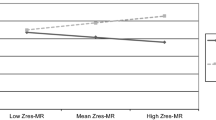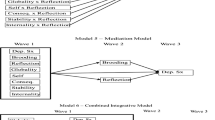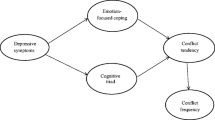Abstract
Research on cognitive models of depression has frequently neglected either the relations between different levels of cognitive-personality variables, the interaction of person and event factors, or both. We evaluated the utility of multivariate, interactional representations of the models of Beck, and of Abramson, Seligman, and Teasdale, for predicting depressive symptoms in a sample of 83 undergraduates. Beck's model was able to account for an estimated 32% of population variance in depressive symptoms, and the reformulated helplessness model for 19% In both cases, these figures are higher than those found in studies that represented the models more simply. Although depressive symptoms were associated with both person and event variables, the hypothesized person-event interaction effects were not found. The strongest correlates of depressive symptoms were perceptions of upsetting real events. Some of these event perceptions were, in turn, associated with the frequency of negative events, suggesting a need for cognitive theories of depression to incorporate a greater emphasis on the objective role of life events.
Similar content being viewed by others
References
Abramson, L. Y., Metalsky, G. I., & Alloy, L. B. (1989). Hopelessness depression: A theorybased subtype of depression.Psychological Review, 96 358–372.
Abramson, L. Y., Seligman, M. E. P., & Teasdale, J. (1978). Learned helplessness in humans: Critique and reformulation.Journal of Abnormal Psychology, 87 49–74.
Alloy, L. B., Clements, C., & Kolden, G. (1985). The cognitive diathesis-stress theories of depression: Therapeutic implications. In S. Reiss & R. Bootzin (Eds.),Theoretical issues in behavior therapy (pp. 379–410). New York: Academic Press.
Beck, A. T. (1967).Depression: Clinical, experimental and theoretical aspects. New York: Harper & Row.
Beck, A. T. (1987). Cognitive models of depression.Journal of Cognitive Psychotherapy, 1 5–37.
Beck, A. T., Rush, A. J., Shaw, B. F., & Emery, G. (1979).Cognitive therapy of depression. New York: Guilford Press.
Bumberry, W., Oliver, J. M., & McClure, J. N. (1978). Validation of the Beck Depression Inventory in a university population using psychiatric estimate as the criterion.Journal of Consulting and Clinical Psychology, 46 150–155.
Cochrane, R., & Robertson, A. (1973). The Life Events Inventory: A measure of the relative severity of psychosocial stressors.Journal of Psychosomatic Research, 17 135–139.
Coyne, J. C., & Gotlib, I. H. (1983). The role of cognition in depression: A critical appraisal.Psychological Bulletin, 94 472–505.
Cutrona, C. E., Russell, D., & Jones, R. D. (1984). Cross-situational consistency in causal attributions: Does attributional style exist?Journal of Personality and Social Psychology, 47 1043–1058.
Hamilton, E. W., & Abramson, L. Y. (1983). Cognitive patterns and major depressive disorder: A longitudinal study in a hospital setting.Journal of Abnormal Psychology, 92 173–184.
Hammen, C. L. (1985). Predicting depression: A cognitive-behavioral perspective. In P. C. Kendall (Ed.),Advances in cognitive-behavioral research and therapy (Vol. 4, pp. 30–71). New York: Academic Press.
Hammen, C. L., & Cochran, S. D. (1981). Cognitive correlates of life stress and depression in college students.Journal of Abnormal Psychology, 90 23–27.
Hammen, C., Marks, T., Mayol, A., & DeMayo, R. (1985). Depressive self-schemas, life stress, and vulnerability to depression.Journal of Abnormal Psychology, 94 308–319.
Kenny, D. A., & Judd, C. M. (1984). Estimating the nonlinear and interactive effects of latent variables.Psychological Bulletin, 96 201–210.
Metalsky, G. I., Abramson, L. Y., Seligman, M. E. P., Semmel, A., & Peterson, C. (1982). Attributional styles and life events in the classroom: Vulnerability and invulnerability to depressive mood reactions.Journal of Personality and Social Psychology, 43 612–617.
Metalsky, G. I., Halberstadt, L. J., & Abramson, L. Y. (1987). Vulnerability to depressive mood reactions: Toward a more powerful test of the diathesis-stress and causal mediation components of the reformulated theory of depression.Journal of Personality and Social Psychology, 52 386–393.
Miller, I. W., Klee, S. H. & Norman, W. H. (1982). Depressed and nondepressed inpatients' cognitions of hypothetical events, experimental tasks, and stressful life events.Journal of Abnormal Psychology, 91 78–81.
Oatley, K., & Bolton, W. (1985). A social-cognitive theory of depression in reaction to life events.Psychological Review, 92 372–388.
Olinger, L. J., Kuiper, N. A., & Shaw, B. F. (1987). Dysfunctional attitudes and stressful life events: An interactive model of depression.Cognitive Therapy and Research, 11 25–40.
Oliver, J. M., & Baumgart, E. P. (1985). The Dysfunctional Attitude Scale: Psychometric properties and relation to depression in an unselected adult population.Cognitive Therapy and Research, 9 161–168.
Persons, J. B., & Rao, P. A. (1985). Longitudinal study of cognitions, life events, and depression in psychiatric patients.Journal of Abnormal Psychology, 94 51–63.
Peterson, C., Semmel, A., von Baeyer, C., Abramson, L. Y., Metalsky, G. I., & Seligman, M. E. P. (1982). The Attributional Style Questionnaire.Cognitive Therapy and Research, 6 297–299.
Riskind, J. H., & Rholes, W. S. (1984). Cognitive accessibility and the capacity of cognitions to predict future depression: A theoretical note.Cognitive Therapy and Research, 8 1–12.
Robins, C. J. (1988). Depression and attributions: Why is the literature so inconsistent?Journal of Personality and Social Psychology, 54 880–889.
Robins, C. J., & Block, P. (1988). Personal vulnerability, life events and depressive symptoms: A test of a specific interactional model.Journal of Personality and Social Psychology, 54 847–852.
Rothwell, N., & Williams, J. M. G. (1983). Attributions and life events.British Journal of Clinical Psychology, 22 139–140.
Teasdale, J. D. (1983). Negative thinking in depression: Cause, effect or reciprocal relationship?Advances in Behaviour Research and Therapy, 5 3–26.
Vinokur, A., & Selzer, M. L. (1975). Desirable versus undesirable life events: Their relationship to stress and mental distress.Journal of Personality and Social Psychology, 32 329–337.
Weissman, A. N., & Beck, A. T. (1978).Development and validation of the Dysfunctional Attitude Scale: A preliminary investigation. Paper presented at the annual meeting of the American Educational Research Association, Toronto.
Wortmann, C., & Dintzer, L. (1978). Is an attributional analysis of the learned helplessness phenomenon viable? A critique of the Abramson-Seligman-Teasdale Reformulation.Journal of Abnormal Psychology, 87 75–90.
Zautra, A. J., Guenther, R. T., & Chartier, G. M. (1985). Attributions for real and hypothetical events: Their relation to self-esteem and depression.Journal of Abnormal Psychology, 94 530–540.
Zuroff, D. C., & Mongrain, M. (1987). Dependency and self-criticism: Vulnerability factors for depressive affective states.Journal of Abnormal Psychology, 96 14–22.
Author information
Authors and Affiliations
Rights and permissions
About this article
Cite this article
Robins, C.J., Block, P. Cognitive theories of depression viewed from a diathesis-stress perspective: Evaluations of the models of Beck and of Abramson, Seligman, and Teasdale. Cogn Ther Res 13, 297–313 (1989). https://doi.org/10.1007/BF01173475
Issue Date:
DOI: https://doi.org/10.1007/BF01173475




